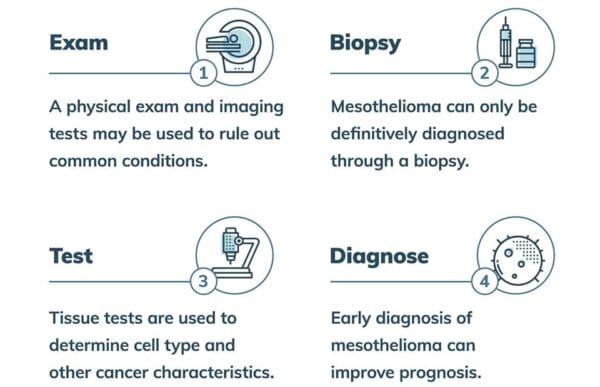How Is Mesothelioma Diagnosed?
Diagnosing mesothelioma involves several tests, including a biopsy. The process often begins when a patient shows symptoms of mesothelioma. But mesothelioma symptoms can be vague, which may lead to misdiagnosis. Patients should share any known history of asbestos exposure with their doctors. This information can help ensure the right tests are ordered.
A simple way to think about it is to break up the diagnosis into two phases:
- Phase 1: The first phase of diagnosis includes general exams and tests.
- Phase 2: The second phase of diagnosis includes specific tests for mesothelioma and cancer.
In the first phase, the patient discusses their full medical history with a doctor. This helps the doctor get information that can narrow down the possibilities. When discussing medical history, the patient has an opportunity to mention asbestos exposure.
The doctor may then conduct a physical exam to look for any lumps or abnormalities. Basic imaging tests, like an X-ray, and blood work may follow. Doctors use blood tests to check a patient’s overall health and organ function. This may also help rule out other conditions.
The second phase involves more advanced diagnostic procedures. The doctor might request specific blood tests. They might also order advanced imaging scans if they suspect mesothelioma. Imaging scans may include:
- Computed tomography (CT)
- Echocardiogram
- Magnetic resonance imaging (MRI)
- Positron emission tomography (PET)
Next, the doctor may order a biopsy, which is a procedure to remove a sample of the suspicious tissue or fluid. Testing a biopsy tissue sample is the only way to confirm a mesothelioma diagnosis. There are many ways a doctor might perform a biopsy, and the method depends on the patient’s case.
A pathology laboratory tests the tissue and fluid samples to learn more about the cancerous cells. Doctors use the test results to determine cell type and other cancer characteristics.
Resources for Mesothelioma Patients
How Do Doctors Test for Mesothelioma?
Doctors generally use several tests to find the cause of their patients’ symptoms. Some common tests include blood tests and imaging scans. These tests may help the doctor diagnose the patient, but biopsies are the only way to confirm a patient has mesothelioma.
Imaging Scans for Mesothelioma
Different imaging tests help doctors identify tumors, their location and metastasis of cancer. Doctors may use X-rays, MRIs, CT scans, PET scans or ultrasounds when diagnosing mesothelioma.
- X-rays: X-rays identify abnormalities and help rule out other conditions. Doctors may use an X-ray to reveal common mesothelioma symptoms. These symptoms may include pleural effusions or peritoneal effusions.
- CT scans: CT scans take a series of X-rays to make a detailed, three-dimensional image of the body. CT scans are an important tool in diagnosing all types of mesothelioma.
- MRI scans: MRIs create intricate images of bones and soft tissue. Doctors use them to find out if mesothelioma has spread into nearby or distant tissues. Doctors also may use the scan as part of the staging process.
- PET scans: PET scans visualize areas of quickly dividing cells, including tumors. This helps distinguish between normal and cancerous tissue. These scans are helpful in showing metastasis.
Biopsies for Mesothelioma
Biopsies are the only way to confirm a mesothelioma diagnosis. These tests involve removing a fluid or tissue sample for analysis. Biopsies help doctors confirm the diagnosis, stage, cell type and type of mesothelioma. Once a biopsy confirms the diagnosis, the medical team can determine treatment options.
There are four types of biopsies commonly used for mesothelioma diagnosis:
- Fluid drainage: Fluid drainage is the least invasive biopsy option. This procedure collects fluid from pleural, peritoneal or pericardial effusions using a needle or catheter. Doctors may drain the fluid sample through thoracentesis, an outpatient procedure. But, in most instances, a fluid sample is not good enough to confirm a mesothelioma diagnosis.
- Needle biopsies: Doctors use a needle biopsy to extract a tissue sample from an affected area. In suspected cases of pleural mesothelioma, the tissue samples may be taken from the pleura (lining of the lung) or a lymph node.
- Surgical biopsies: Surgical biopsies are the most invasive biopsy procedure. Doctors may use this biopsy when mesothelioma tumors are difficult to reach. Surgical biopsies used for mesothelioma include thoracotomy and laparotomy.
- Surgical camera-assisted biopsies: These biopsies start with a small incision. Then, the doctor places a tube and passes a small camera through it into the affected area. Doctors can then locate and retrieve any suspicious-looking tissue for analysis. Types of camera-assisted biopsies used for mesothelioma include thoracoscopy, laparoscopy and mediastinoscopy.
Mesothelioma Blood and Tissue Tests
A mesothelioma doctor may use blood tests to check overall patient health and to find specific markers that suggest cancer. Doctors generally use tissue tests to make a diagnosis.
Blood tests alone cannot diagnose mesothelioma. But they may guide the doctor towards a diagnosis. For example, the complete blood count (CBC) can identify changes in blood cell and platelet levels. More advanced tests can find specific markers that point to a mesothelioma diagnosis.
The only way a doctor can confirm a mesothelioma diagnosis is to examine cells from the abnormal area. The doctor collects these tissues during a biopsy and sends them to a lab where they are examined. Specialists then test the samples to determine which types of cells they contain.
Doctors may diagnose mesothelioma if the tests on the abnormal tissues find mesothelioma traits. Abnormal tissues that do not have mesothelioma properties may suggest a different condition.
How Does Pathology Help Diagnose Mesothelioma?
Pathology is the study of how a disease develops and affects a person. Pathology testing can identify and conclusively diagnose mesothelioma. Mesothelioma pathology includes two types of testing: histology and cytology.
- Cytology analyzes individual cells and their properties. Cytopathology does the same thing with cells affected by diseases, including mesothelioma. Cytopathology testing can help identify specific mesothelioma cell types. In general, cytology alone cannot diagnose mesothelioma. But it can help doctors order more tests that can confirm a diagnosis.
- Histology analyzes tissue samples like those of a mesothelioma biopsy. Histopathology does the same thing with tissues affected by diseases, including mesothelioma. Histopathology testing can use special dyes to identify markers of mesothelioma. This form of testing can confirm a mesothelioma diagnosis.
Doctors use pathology testing to confirm a mesothelioma diagnosis. Patients can help doctors order the right tests by sharing any known history of asbestos exposure. This may speed up the diagnostic process and help ensure timely mesothelioma treatment.
Does Screening Help Detect Mesothelioma Early?
There is no officially recognized test to detect mesothelioma early. But researchers continue to study possible early detection methods.
Doctors may recommend routine monitoring to patients with past exposure to asbestos. Some people who work in at-risk occupations for asbestos exposure may have mandatory screenings. These screenings may include:
- Chest X-rays
- Pulmonary function tests
- Specific physician-ordered lab tests
Mesothelioma symptoms can take decades to show up. The time between initial asbestos exposure and the onset of symptoms is called the latency period. For mesothelioma, the latency period commonly ranges from 10 to 50 years. Monitoring may help doctors detect signs of the disease earlier. Getting diagnosed and treated earlier has been linked to better patient outcomes.
For example, patients with stage 1 or stage 2 mesothelioma may be able to undergo multimodal treatment. This approach often includes surgery. These treatments have improved life expectancy for many mesothelioma patients.
Those diagnosed at stage 3 or stage 4 mesothelioma may have fewer treatment options. But the available treatments can still extend survival. In general, patients with advanced mesothelioma have a more favorable prognosis with treatment.
Doctors may also recommend palliative therapies. These treatments aim to reduce symptoms, improve comfort and potentially extend life expectancy.
Why Is It Hard to Get an Accurate Mesothelioma Diagnosis?
Doctors may have trouble accurately diagnosing mesothelioma for many reasons. It shares symptoms with other illnesses and is very rare. Only about 3,000 new cases are diagnosed in the United States each year.
Non-specialized doctors may have never seen or treated mesothelioma. This may make them more likely to misdiagnose mesothelioma. A few common misdiagnoses include:
- Breast cancer
- Bronchitis
- Diverticulitis
- Emphysema
- Lung cancer
- Pneumonia
Patients may want to get a second opinion because misdiagnoses do happen. People with known asbestos exposure should see mesothelioma experts for their second opinions. Research suggests a second opinion from a mesothelioma expert may lead to better patient outcomes.
Getting the Best Treatment After a Mesothelioma Diagnosis
Patients may help ensure the most effective treatment by seeking out mesothelioma experts. These specialists have experience treating mesothelioma. They may be able to provide more accurate staging and better treatment options.
Mesothelioma patients have an array of treatment options. Several have already helped some patients outlive their original prognoses. And research has expanded treatment options in recent years. As additional clinical trials take place, more treatment options may become available.
For example, research into checkpoint inhibitor drugs has led to improved outcomes. The drugs Opdivo® (nivolumab) and Yervoy® (ipilimumab) have more than doubled survival for some patients. Plus, advancements in chemotherapy, such as HIPEC and HITHOC, have also helped many patients. Patients who seek treatment at experienced cancer centers may have easier access to these and other therapies.
Common Questions About Mesothelioma Diagnosis
- How difficult is it to diagnose mesothelioma?
Mesothelioma can be difficult to diagnose. It has nonspecific symptoms, which means it can resemble other conditions. Plus, signs of the disease can be subtle and difficult to identify in imaging scans. It helps when the doctor knows the patient has a history of asbestos exposure.
- How do you detect mesothelioma early?
No diagnostic test has approval for early diagnosis of mesothelioma. Early detection depends on if the doctor knows the patient has been exposed to asbestos. With this knowledge, doctors can monitor for signs of the disease using:
- Chest X-rays
- Pulmonary function tests
- Specific physician-ordered lab tests
- What tests are done to diagnose mesothelioma?
Doctors may perform several tests before diagnosing mesothelioma. Tests may include blood tests, X-rays, CT scans or other imaging. These tests may suggest mesothelioma. But the only way to definitively confirm mesothelioma is through a tissue biopsy.












